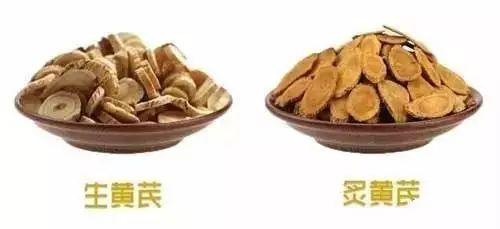
Astragalus (Huang Qi) is a renowned tonic in Traditional Chinese Medicine (TCM), with a medicinal history spanning over 2000 years. It is classified as a superior herb in the “Shen Nong’s Herbal Classic”.
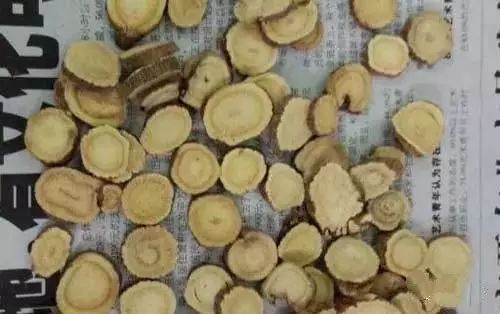
Modern medical research indicates that it is rich in sucrose, polysaccharides, various amino acids, and trace elements such as selenium, zinc, and copper. It can effectively enhance the body’s immune function, improve myocardial blood supply, and regulate blood sugar levels. Its applications in TCM are extensive; it can tonify Qi, generate blood, alleviate gastric prolapse, improve constitution, and even delay cellular aging…
Why is it better than Ginseng?
Ginseng is a powerful tonic for restoring original Qi, providing a strong and rapid effect, but it can easily cause internal heat. Clinically, it is often used to treat severe or chronic illnesses, or symptoms such as shortness of breath, fatigue, cold limbs, excessive sweating, and a weak pulse due to Qi deficiency.
Astragalus tonifies Qi with a milder effect, gradually increasing its efficacy without causing chest tightness or internal heat. The renowned TCM practitioner Lu Zhong’an was known for his adept use of Astragalus, earning it the nickname “Lu Huang Qi” to rival the Ming Dynasty physician Zhang Jingyue.
High-quality ginseng can cost over a thousand yuan per pound, while Astragalus is only a few dozen yuan per pound, making it a cost-effective option with comparable benefits.
1 Qi Tonic Effect Comparable to Ginseng
Compared to American ginseng and Codonopsis, the Qi tonifying effect of Astragalus is equally impressive, making it suitable for the general public. For those with Qi deficiency, shortness of breath, susceptibility to colds, and excessive sweating, regularly consuming Astragalus is a great choice.
In TCM, it is used to alleviate chronic diseases such as hypertension, diabetes, and chronic nephritis, as well as for recovery from severe illnesses and to promote wound healing after surgery.
2 Cardiovascular Protector

Astragalus has cardiotonic, antihypertensive, antiarrhythmic, and cardiovascular protective effects, making it suitable for individuals with cardiovascular issues.
3 Protects the Gastrointestinal and Hepatobiliary Systems
Astragalus provides protective effects for both the gastrointestinal and hepatobiliary systems. Patients with hepatitis, gastritis, and gastric ulcers often use Astragalus to aid in treatment.
4 Assists in Cancer Treatment
The polysaccharides in Astragalus can enhance the efficacy of anti-tumor medications while reducing side effects. For cancer patients, long-term use of Astragalus can provide supportive anti-cancer effects.
Of course, there are distinctions between raw Astragalus and honey-fried Astragalus, which can be purchased according to individual needs.
Differences Between Raw and Honey-Fried Astragalus
Difference 1: Raw Astragalus is sun-dried and unprocessed, while honey-fried Astragalus is cooked with honey.
Difference 2: Generally, raw Astragalus is used for tonifying Qi and strengthening the exterior (enhancing resistance) and for benefiting the spleen and eliminating dampness (reducing swelling).
Difference 3: Honey-fried Astragalus excels in tonifying Qi and treating spleen Qi deficiency, as well as conditions like gastric prolapse.
Four Daily Consumption Methods
How should Astragalus be consumed for the best effects? For patients with hypertension and diabetes, there are mainly four methods.
1Chewing
Chew raw Astragalus like sunflower seeds; it has a pleasant taste reminiscent of beans.
2Tea

Use 5-10 grams of Astragalus slices (not exceeding 15 grams per serving) and steep in boiling water for 10-20 minutes to drink as tea. For a stronger flavor, it can be steeped multiple times.
3Porridge
Use 15 grams of Astragalus, 10 grams of Codonopsis, 100 grams of glutinous rice, and 30 grams of jujube. First, decoct Astragalus and Codonopsis to extract the essence, then add jujube and glutinous rice to cook into porridge, which is delicious.
4Cooking
If you enjoy roasted meats or ducks, you can add an appropriate amount of Astragalus for a unique flavor and nourishing effect.
Three Experience Recipes
For Recurrent Colds and FatigueQi-Boosting Decoction
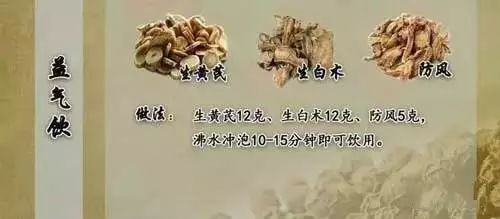
Preparation:12 grams of raw Astragalus, 12 grams of Bai Zhu (White Atractylodes), and 5 grams of Fang Feng (Siler). Steep in boiling water for 10-15 minutes before drinking.
Corresponding Symptoms:Frequent colds, recurrent allergic rhinitis, shortness of breath, fatigue, dizziness, and excessive sweating upon exertion.
Contraindicated Population:Those with internal heat should avoid this decoction, as it may exacerbate their condition.
Anemia and Shortness of BreathBlood-Boosting Soup
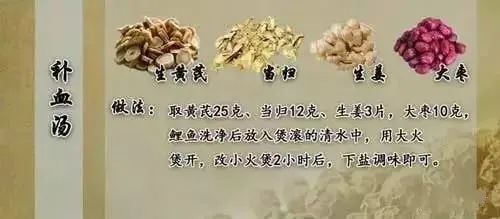
Preparation:Use 25 grams of raw Astragalus, 12 grams of Dang Gui (Angelica Sinensis), 3 slices of ginger, and 10 grams of jujube. Clean the carp and boil it in water, then simmer for 2 hours and season with salt. This soup can tonify Qi and generate blood, suitable for all ages.
Corresponding Symptoms:Fatigue, palpitations, shortness of breath, fatigue, pale lips and nails, dizziness, and worsening symptoms with exertion.
Fatigue, Swollen Legs, and Poor AppetiteAstragalus and Job’s Tears Porridge
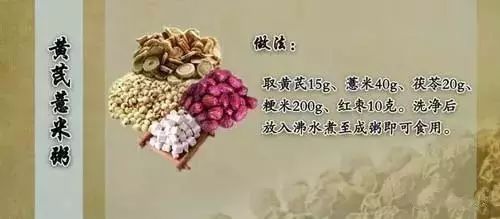
Preparation:Use 15 grams of raw Astragalus, 40 grams of Job’s Tears, 20 grams of Poria, 200 grams of glutinous rice, and 10 grams of jujube. Wash and boil in water until it becomes porridge.
Corresponding Symptoms:Slight swelling of the eyelids or lower limbs (common before and after menstruation, during menopause, or postpartum); fatigue, swollen legs; joint pain, difficulty urinating, poor appetite, and loose stools.
Contraindicated Population:Those with frequent urination, excessive urination, Yin deficiency, and dry mouth should avoid this recipe.
The above content is sourced from the internet, and we express our gratitude to the original author!


